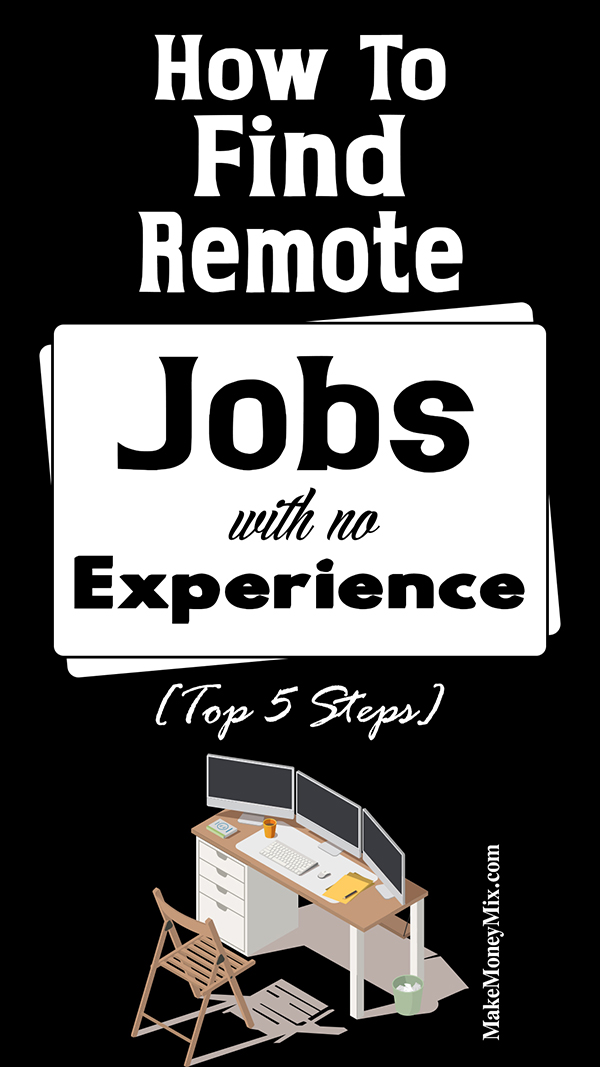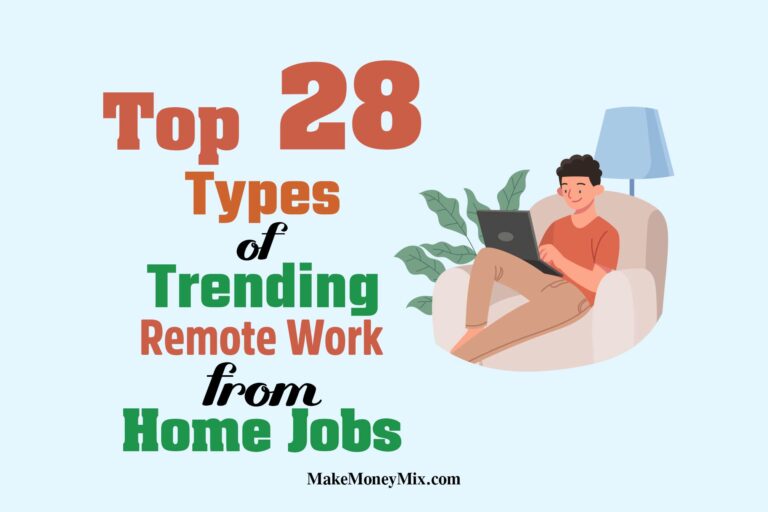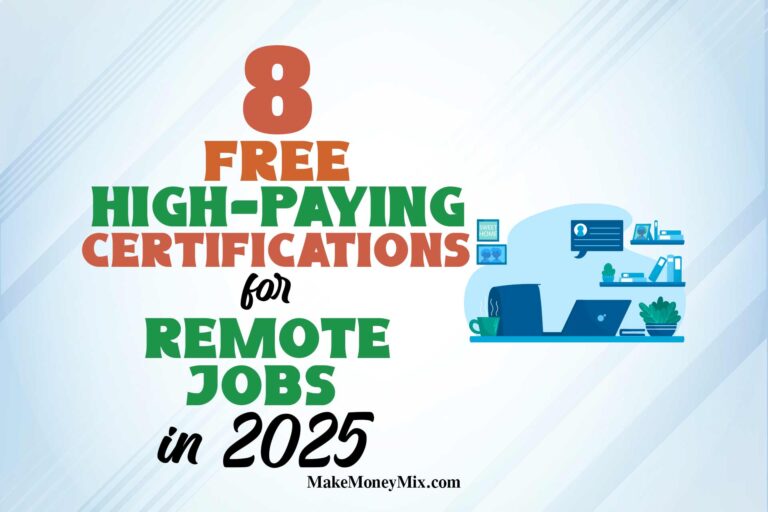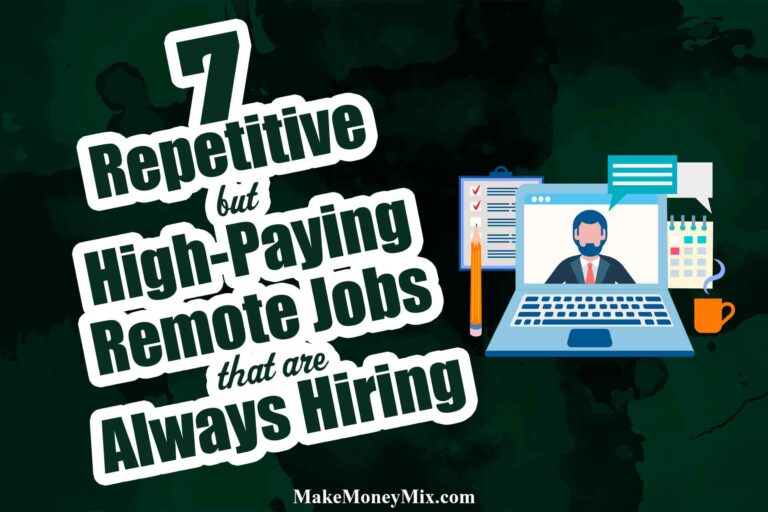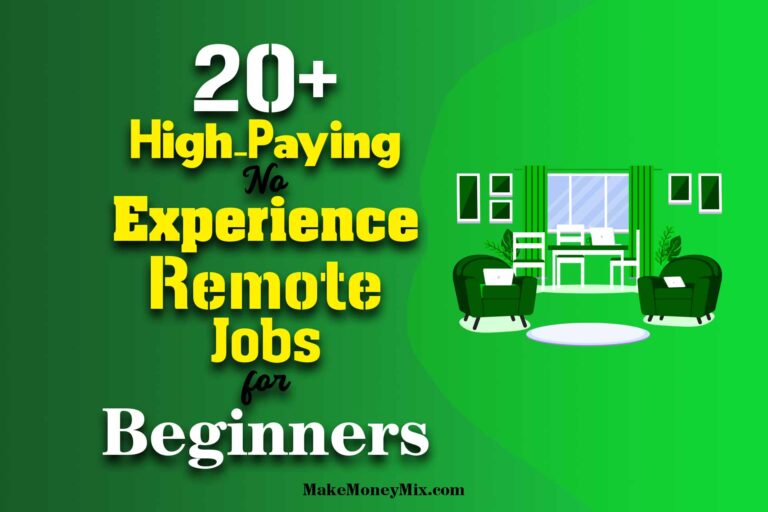How To Find Remote Jobs with No Experience [Top 5 Steps]
![How To Find Remote Jobs with No Experience [Top 5 Steps]](https://makemoneymix.com/wp-content/uploads/2025/08/How-To-Find-Remote-Jobs-with-No-Experience-Top-5-Steps.jpg)
Have you ever stared at your blank résumé and thought, “How am I going to land a remote job when everyone keeps asking for experience I don’t have?”
Yeah, I’ve been there. Maybe a few too many times.
But I learned that scoring a remote gig without a solid résumé packed with relevant jobs is totally doable.
You just need to play the game with a few smart moves, think of it as hacking the system (legally, of course).
Ready? Let’s get right into it.
Can I Really Get a Remote Job with No Experience?
You absolutely can. Tons of companies love hiring people who are new but show real motivation, curiosity, and a willingness to learn.
And the best part? You don’t need a gold-plated résumé, your attitude and eagerness matter way more.
If you show up hungry to learn and are a bit resourceful, you’ll stand out quicker than you think.
Many have landed remote gigs by highlighting soft skills, personal projects, or even volunteer work.
So, don’t second-guess yourself. Your “no experience” could just mean you bring a fresh perspective, and that’s exactly what some teams want!
Pretty cool, right?
Here’s more: 10 Helpful Tips for Finding Remote Jobs from the Pros
Step 1: Build a Job-Worthy Foundation (Without the Actual Job)
Let’s keep it real for a sec. You can’t stroll into a remote job with nothing. But don’t hit the panic button!
You don’t need years of experience; you just need to show you can hang.
What Can You Offer Right Now?
Think about all the non-job stuff you’ve done. Maybe you:
- Helped a friend set up their Etsy shop (hello, digital skills!)
- Moderated a Discord server (community management, anyone?)
- Took an online course in Excel, Canva, or social media marketing
You get the point. Jot those experiences down. Employers want skills, not necessarily old-school “work” jobs.
Pro Tip: Stack these little wins into a “Skills” or “Projects” section on your résumé. It’s all about flexing what you do know, even if you didn’t get paid for it.
Get Your Online Presence Up and Running
Let’s face it, Google is the first HR manager most people will meet. Try this:
- Create a killer LinkedIn profile with a friendly pic and real summary (not that robotic stuff)
- Build a simple portfolio, even a Google Doc works
- Share helpful industry tips on your socials (shows you’re tuned in!)
FYI, 70% of employers stalk candidates online before making an offer. Don’t let your TikTok dances be the only thing they find.
Here’s more: 20 Insanely Clever Remote Job Hacks You Wish You Knew Sooner
Step 2: Find the Remote Jobs No One’s Talking About
Sure, you’ll spot the big sites with every remote job under the sun. But want the real secret sauce?
The best gigs hide in plain sight.
Job Boards Just for Remote Newbies
I know, job boards are packed with thousands of relevant and irrelevant circulars.
But these sites serve fresh, entry-level remote jobs daily:
- We Work Remotely
- Remote.co
- FlexJobs (yes, there’s a fee, but sometimes you gotta invest in yourself)
- Working Nomads
- Dynamite Jobs
Most of these boards let you filter for “No Experience” or “Entry-Level.” Use it!
Don’t Sleep on Social Media
I am seriously saying that Twitter, Reddit, and even TikTok are full of remote job leads.
Try searching hashtags like #remotework, #hiring, or #entrylevel.
If you really want to get ahead, join a few Facebook or Discord groups focused on remote job seekers.
In these communities, people share leads that you won’t find on mainstream boards. And sometimes, recruiters lurk, looking for fresh faces.
Here’s more: 8 FREE High Paying Certifications For Remote Jobs in 2025
Step 3: Apply Like a Human (Not a Robot)
You know that Submit button, so many people click without thinking? Forget it. You want to stand out, don’t you?
Custom Cover Letters (I Swear, It’s Easy)
Write a short, personal note with each application. No need for poetry, just show you did your homework.
Example: “Hey Jane, I noticed your company values creative thinkers. That’s my jam.
During my time organizing the uni hackathon, I loved brainstorming ways to boost engagement. I’d love to bring that same energy to your remote team.”
Quick, punchy, and genuine. That’s all it takes.
Tweak Your Résumé for Every Job
Yes, it’s annoying. But it works. If the job wants “detail-oriented” folks, make sure your résumé screams that (by, you know, actually being detail-oriented).
Bullet points rule:
- Led a team of 5 to run an online event with 150+ attendees
- Designed a budget tracker for a student group, saving hours in admin time per week
Each bullet should spotlight a result, not just a duty.
Don’t write, “Did social media.” Instead, say, “Grew Instagram page by 250 followers in 2 months.”
Step 4: Learn on the Fly. Show Employers You Level Up Fast
No experience? No problem. Employers love fast learners. They’d rather teach you than hire someone “experienced” with a lousy attitude.
Level Up Your Skills (Free + Fast)
Check out these resources:
- Coursera/edX: Free versions of many classes (keep an eye out for certificates)
- YouTube: Some creators break down technical stuff so well it’s wild
- LinkedIn Learning: Free with some library cards or student accounts
- Google Digital Garage: Tons of free digital skills courses
Here’s the trick: Don’t just watch. Build something tiny with every skill you learn. Then, brag about it.
The more you show, the less you have to tell.
Share Your Learning Journey
Document your learning on LinkedIn, Twitter, or a blog.
Something like, “Just finished my first project automating emails. I can’t believe how much time it saves!” gets noticed.
People love a behind-the-scenes look.
Step 5: Nail the Interview (Even If It’s Your First One)
Let’s talk about interviews. Scary? Sure.
But you can go from meh to “wow” with a little prep.
Practice, Practice, Practice
Record yourself answering common interview questions.
I know, it feels weird, but you’ll spot all your quirks and smooth them out.
Even if you bomb the first round, you’ll get better.
Classic questions to nail:
- Why do you want to work remotely?
- Tell us about a time you solved a problem or worked in a team.
- Where do you see yourself growing up with us?
Throw in your real stories, don’t make stuff up. Empathy and honesty impress people more than textbook answers.
Show Off Your Soft Skills
Remote work needs great communication, reliability, and self-motivation.
Think of stories where you’ve:
- Managed a project solo
- Helped a group hit a deadline
- Bounced back from a mistake
Use these stories to prove you’re ready. Even when you ran a high school club count.
Final Tip: Don’t panic when you don’t know something.
Say, “I haven’t done that yet, but here’s how I’d tackle it.” Employers dig problem-solvers.
Bonus: Avoid Classic Mistakes
You know what’s wild? Most people trip themselves up before they even start. Don’t be that person.
- Don’t apply to every job you see (you’ll burn out)
- Don’t ghost recruiters. Just reply, even if it’s a “No thanks.”
- Don’t fudge the truth on your résumé (embarrassing stories for days…)
Stay authentic. It moves you ahead faster than pretending you’re something you’re not.
What Are the Easiest Remote Jobs to Start With?
Look at these entry-level remote roles:
- Customer support rep
- Virtual assistant
- Social media manager
- Data entry specialist
- Junior content writer
FYI: Most of these value good communication, attention to detail, and time management. You can learn those now.
How Long Will It Take to Land a Job?
No sugarcoating, it varies. Some people score in weeks; others take a couple of months. The key is to keep at it, tweak your strategy, and network with other job seekers.
More Remote Jobs:
- 19 Places to find REMOTE Customer Service Jobs Online
- 100 Best Companies to Watch for Remote Jobs in 2025
- 21 BEST Websites to Find Remote Jobs Online in 2025
- 12 Remote Jobs You Can Do At Night To Make Up To $83 Per Hour
- 7 Repetitive But High-Paying Remote Jobs That Are Always Hiring
- 20+ High Paying No Experience Remote Jobs for Beginners
- Top 28 Types of Trending Remote Work from Home Jobs in 2025
Final Thoughts
So, remember those five steps:
- Build a solid foundation (even if you haven’t held a “job” yet)
- Hunt for the right entry-level remote gigs
- Apply smarter, not harder
- Learn as you go (and show it off)
- Crush your interviews with real stories and energy
Don’t get discouraged if you don’t nail it immediately. Most people get told “no” way more than “yes”; it’s a rite of passage.
IMO, your unique skills and fresh perspective will take you farther than you think.
Ready to find that first remote job? Believe in yourself, show up authentically, and laugh off the fails (trust me, you’ll collect a few).
Next thing you know, you’ll be working in pajamas, ruling the remote world, and yes, maybe even giving your own advice to newbies someday.
Now make it happen!

